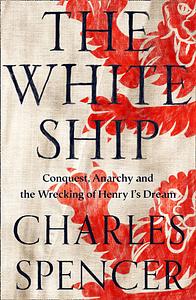You need to sign in or sign up before continuing.
Take a photo of a barcode or cover
168 reviews for:
The White Ship: Conquest, Anarchy and the Wrecking of Henry I's Dream
Charles Spencer
168 reviews for:
The White Ship: Conquest, Anarchy and the Wrecking of Henry I's Dream
Charles Spencer
Spenser packs a lot into this book. A couple of times I felt overwhelmed by the number of names and relationships* (for example, there are so many Matildas!), but I enjoyed it and will never forget Henry I, his daughter Empress Matilda, or the idiocy that sunk the White Ship 901 years ago on 25 November 1120.
I’d actually like to read more about Empress Matilda. Anyone have reading recommendations?
* Spencer does a good job of reminding the reader who’s who, it just took some extra brain power to keep them all organized in my mind.
I’d actually like to read more about Empress Matilda. Anyone have reading recommendations?
* Spencer does a good job of reminding the reader who’s who, it just took some extra brain power to keep them all organized in my mind.
informative
medium-paced
A very interesting account of the reigns of William the Conqueror through to Henry the Second. I thought this book really complemented "The Pillars of the Earth" by Ken Follett. This book filled some of the back history of that novel.
informative
slow-paced
As other reviewers have pointed out, over half of The White Ship is devoted to context, providing an overview of the preceding half-century or so of Norman rule. Given that I picked the book up not for this zoomed-out view, but instead for a more in-depth exploration of the accident itself and the immediate aftermath, I found myself a little disappointed.
The chapter covering the accident itself was great, but that’s all it was—a chapter—and the one before it was a rather tedious list of all the various names of people who happened to be in Barfleur that day, whether they were travelling on the White Ship or not.
On a positive note, I did quite enjoy the coverage of the Anarchy in the final quarter of the book. I think this book might be a valuable reference for academics, and I appreciated the citations throughout. But as a book for the general reader, I’m afraid it falls a little short, and I say this as a fan of other narrative history books like The Plantagenets and The Hollow Crown by Dan Jones. Nevertheless, I do not begrudge the time I spent reading this book.
The chapter covering the accident itself was great, but that’s all it was—a chapter—and the one before it was a rather tedious list of all the various names of people who happened to be in Barfleur that day, whether they were travelling on the White Ship or not.
On a positive note, I did quite enjoy the coverage of the Anarchy in the final quarter of the book. I think this book might be a valuable reference for academics, and I appreciated the citations throughout. But as a book for the general reader, I’m afraid it falls a little short, and I say this as a fan of other narrative history books like The Plantagenets and The Hollow Crown by Dan Jones. Nevertheless, I do not begrudge the time I spent reading this book.
1120 the White Ship sinks with Henry I of England and Duke of Normandy’s heir, William, on board. The fates of England and Normandy are bound up in family feuds, politics, religion and war. A great description of the era from William the Conqueror through to Henry II.
the author goes on tangents here and there, but provides a very good overview of how the Norman conquest eventually brought the Plantagenets to the English throne
Good but a little brief and general in some respects. At other times too, the book's narrative seemed to move entirely too fast which may be a benefit for some readers but wasn't to my taste.
It’s always going to be a stretch to write a book about a very brief event that had no mystery to it. That said, the overview of the Norman invasion is really good and the impact of the death of William Aethling is covered - albeit in less space than the preceding events. My issue is that the book is a relentless narrative of people and what they did with very little insight or analysis. Accessible for the general reader wanting to know how the Norman conquest unfolded but becomes less cohesive and clear during the anarchy. 90 pages to cover this period is always going to be a stretch and Spencer has not attempted to woke out who the key people really are so the CS sees of characters is vast and unwieldy. Equally, the reliance on Henry of Huntingdon as the man source feels less than academic and there is no attempt to evaluate this. When compared to Marc Morris’ book of the conquest this falls very short in terms of research and academic rigour, and although readable is not as enjoyable. Decent, but doesn’t really break new ground.
I was interested in this book because it's focal point is the event that kicked off events in one of my favorite books, Pillars of the Earth. I enjoyed it far more than I expected. I was engaged throughout learning about all the varied characters, from William the conqueror's parents to his great grandchildren. The politicking and drama on display during this turbulent time is laid out clearly and concisely. Highly recommend.





